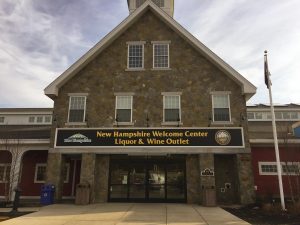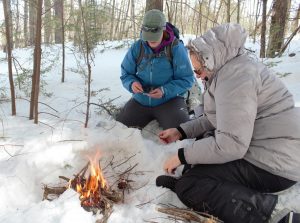Episode 84: If You Build It

New Hampshire is known for its mountain views, but it’s got another less family-friendly attraction- cheap liquor. Out-of-staters have been skirting the legal limits of what you can buy at state-owned liquor stores, but the government is not so keen to investigate. And while we try to stay warm, we hear about a program that helps Connecticut residents keep the drafts out, and visit a company in Maine that builds some of the most efficient homes on the market. Plus, we parse what New England communities ask from their local baseball teams – and what the owners of those teams are asking from taxpayers in two struggling cities.

The Hartford Yard Goats play the Trenton Thunder at Dunkin Donuts Park, Hartford, Connecticut, in July 2017. (Jesse Douglas/CC)
The Hennessy State
In the absence of an income or sales tax, New Hampshire uses the lure of cheap liquor to help balance the books. The state owns and operates about 80 retail liquor stores – nearly every liquor store in the state. Many of these low-cost, high volume outlets are strategically located on the state’s southern border, some at highway rest stops.
Recently, out-of-staters have been arrested for cash transactions that skirt legal limits, and one elected official from New Hampshire is sounding the alarm. The liquor at the center of his concerns is Hennessy cognac.
New Hampshire Public Radio’s Todd Bookman is part of a reporting team that has been looking into this story. And he says its not the first time the issue has surfaced in the state.
All About Efficiency
As New England’s aging fleet of oil and nuclear plants retire, one way to make up for lost energy is to build more generation: new solar panels or wind turbines.
But before we add to the grid, there is a simpler way to lower emissions –improve the energy efficiency of homes. As Connecticut Public Radio’s Patrick Skahill reports, a home energy audit can help with that by sealing up houses from wind and helping to lower heating bills. But as state budgets tighten, some of those programs are going away.
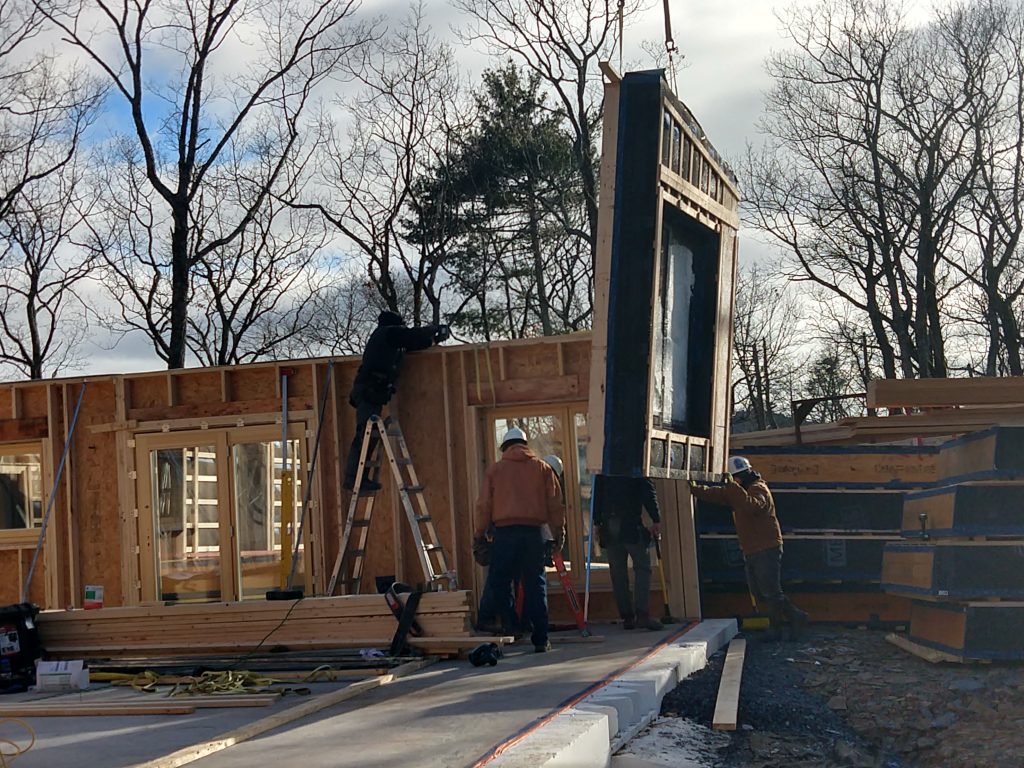
A wall section is lowered by a crane on to the foundation of a “passive house” manufactured by the Maine company Ecocor. (Jon Kalish/NEXT)
European architects and house builders have taken the lead in building the healthiest and most energy efficient homes. They are part of the so-called passive house movement, which began in the early 1990’s in response to high energy costs. In the last ten years passive homes have been popping up in the United States. The leading builder of these homes, a company called Ecocor, is based in rural Maine. Independent producer Jon Kalish has more.
Root for the Home Team

Built in the 1940s, McCoy Stadium in Pawtucket is the home of the PawSox, a farm team for the Boston Red Sox. The team is asking for public money to build a new stadium in downtown Pawtucket. (Elisabeth Harrison/RIPR)
Minor league baseball is booming across America. It’s family-friendly, relatively inexpensive, and it brings the sport to small and mid-sized cities that don’t have major league baseball.
Pawtucket, Rhode Island has been home to minor league baseball since the early 1970s, and the city has had a special kind of relationship with its team ever since. It doesn’t hurt that the team- the Pawtucket Red Sox- is affiliated with the Boston Red Sox, located just an hour up the highway.
Red Sox legends like Jim Rice, Wade Boggs and Roger Clemens all played for the team lovingly known as the “PawSox” at old McCoy Stadium.
But now team officials say they need a new stadium. It’s launched a political battle over public funding for a private stadium, and brought back some bad feelings left from another baseball-related deal in Rhode Island’s recent past.
Rhode Island Public Radio political reporter Ian Donnis brings us the latest on this political fight over a cherished civic institution.

Areas of land the city of Hartford, Connecticut, is looking to develop around the minor league baseball stadium. (Courtesy: City of Hartford)
The city of Hartford already built a brand-new minor league ballpark to lure a minor league team from nearby New Britain, Connecticut. Much like in Pawtucket, the plan is to build residential and retail developments near the park.
The surrounding North End neighborhood currently has a lot of vacant lots and boarded-up buildings. And while the Hartford Yard Goats played their first season at the ballpark last year, the adjacent developments have yet to begin.
Hartford residents are thinking about what should come next, what the area needs, and what might be lost. New England Public Radio’s Heather Brandon reports.
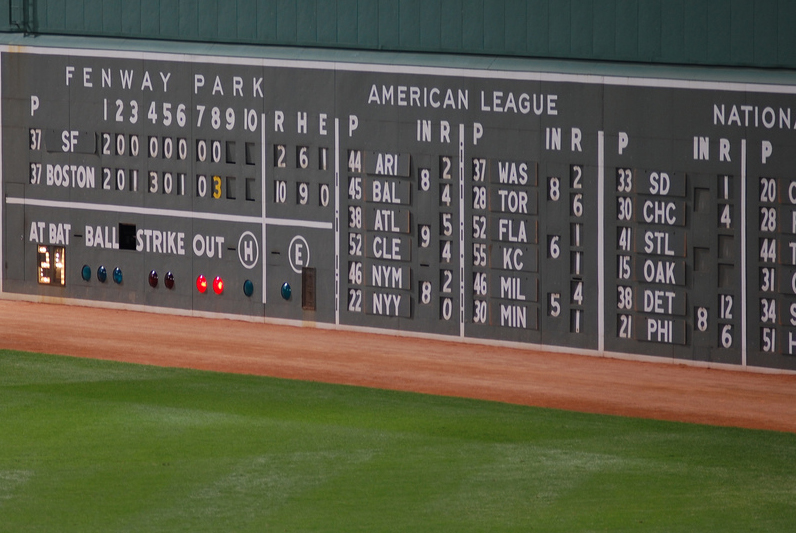
Tom and Jean Yawkey’s initials depicted in Morse code line the white stripes separating the American League scores on the Green Monster at Fenway Park. (Eric Kirby/Flickr)
And this week, New England’s only major league baseball team is reckoning with its past…sort of. Last week, the Red Sox filed a petition with the City of Boston to change the name of the street that Fenway Park sits on. That street is named Yawkey Way after Tom Yawkey, who became the last major league team owner to hire a black player in 1959. The petition would return the street to its original name – Jersey Street.
But as WBUR’s Ally Jarmanning reports, there’s still a visible reminder of Tom Yawkey’s legacy at Fenway.
Confronting Hate on Campus
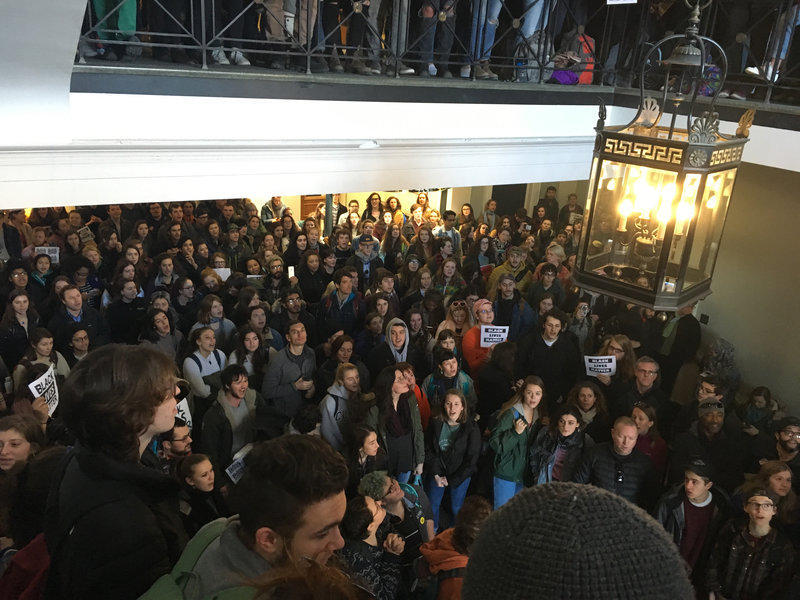
University of Vermont students walked out of class in February 2018, demanding the school do more to address racial justice and inequity on the Burlington campus. (Liam Elder-Connors/VPR)
It seems every few weeks there is a hate crime reported on a college campus in New England. The groups that keep track of these incidents say there is, in fact, a marked increase in the number of racist slurs found scrawled on campus walls and an increase in white supremacist group activity.
As New England Public Radio’s Jill Kaufman reports, protests are also on the rise, as students demand their schools and classmates pay more attention to why hate has come to campus.
Wild Women
Do you have what it takes to be an outdoors-woman? New Hampshire Public Radio’s Annie Ropeik attend a winter survival skills class with the New Hampshire Department of Fish and Game where participants start fires, built show shelters, and learn to fend for themselves.
About NEXT
NEXT is produced at Connecticut Public Radio.
Host: John Dankosky
Producer: Andrea Muraskin
Executive Producer: Catie Talarski
Contributors to this episode: Todd Bookman, Lauren Chooljian, Casey McDermott, Patrick Skahill, Jon Kalish, Ian Donnis, Heather Brandon, Ally Jarmanning, Jill Kaufman and Annie Ropeik
Music: Todd Merrell, “New England” by Goodnight Blue Moon
Get all the NEXT episodes.
We appreciate your feedback! Send critique, suggestions, praise, questions, story ideas, and winter survival tips to next@wnpr.org.

